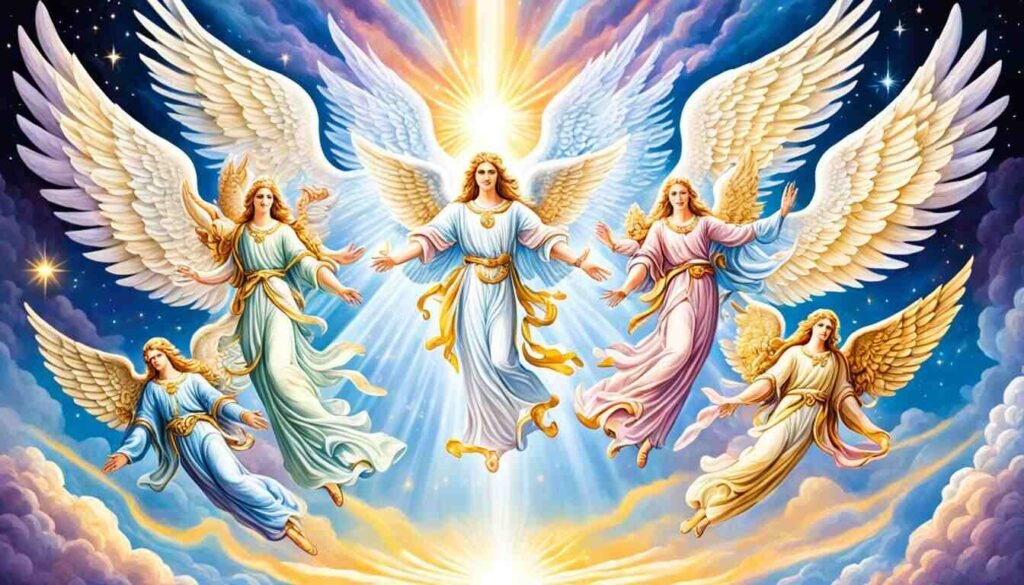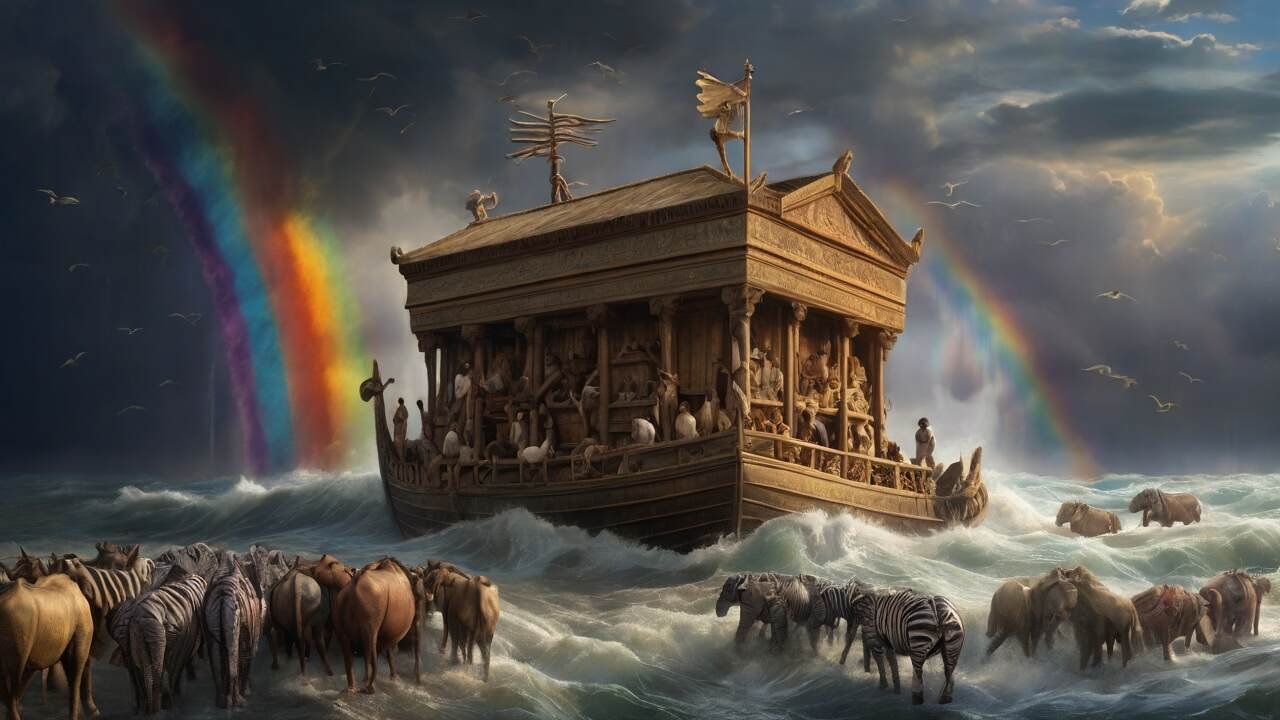The concept of angels is deeply rooted in the Old Testament, where they are depicted as divine messengers and guardians sent by God to interact with humanity. While the Hebrew language does not have a specific word that directly translates to our modern understanding of “angel,” the term “mal’ak” is frequently used to describe these spiritual beings.
Over time, the understanding of angels evolved in ancient Israel, from serving as personifications of God’s protective actions to becoming distinct celestial entities with hierarchies and specialized roles.
Key Takeaways
- The concept of angels is deeply rooted in the Old Testament, where they are depicted as divine messengers and guardians.
- The Hebrew term “mal’ak” is used to describe these spiritual beings in the Old Testament.
- The understanding of angels evolved over time, from serving as personifications of God’s actions to becoming distinct celestial entities.
- Angels played a crucial role in the interactions between God and humanity in the Old Testament.
- The Old Testament provides a rich tapestry of angelic hierarchies, roles, and manifestations.
Unveiling the Concept of Angels in the Old Testament
In the Old Testament, the Hebrew word “mal’ak” is often translated as “angel,” though it can also refer to human messengers. The understanding of angels in ancient Israel was not as clearly defined as in later Christian theology. Initially, the “Angel of Yahweh” was seen as a personification of God’s protective presence, but over time, angels became recognized as distinct spiritual entities with their own hierarchies and roles.
The Hebrew Understanding of Angels
The Old Testament’s portrayal of angels reflects the evolving beliefs and perceptions of the ancient Israelites. The mal’ak, or “messenger,” was often used to describe both human representatives and divine beings. This ambiguity in the terminology suggests that the concept of angels was not yet fully developed in the early stages of the Old Testament narratives.
The Evolution of Angelology in Ancient Israel
As the Old Testament narratives unfold, the understanding of angels gradually became more nuanced. The influence of the cultural environment, such as beliefs in cherubim and seraphim, also shaped the evolving angelic hierarchy in ancient Israel. These spiritual entities were often depicted as guardians or attendants of the divine presence, foreshadowing the more elaborate angelology that would emerge in later Jewish and Christian traditions.
“The Angel of Yahweh was seen as a personification of God’s protective presence, but over time, angels became recognized as distinct spiritual beings.”
The role and nature of angels in the Old Testament reflect the ongoing spiritual exploration and changing theological perspectives of the ancient Israelites. As the concept of angels evolved, they became increasingly recognized as vital spiritual entities within the Old Testament’s narrative framework.
The Angel of Yahweh: A Unique Divine Presence
In the Old Testament, a recurring figure known as the “Angel of Yahweh” holds a unique and intriguing position. This divine messenger, often identified with God himself, appears in various theophanies – manifestations of God’s presence – and directly interacts with individuals such as Hagar, Abraham, and Moses.
The Angel of Yahweh’s ability to forgive sins and speak on behalf of God suggests a divine status, blurring the line between the angel and Yahweh. This enigmatic figure has led to ongoing debates among scholars regarding the exact nature of the angel’s relationship with the divine.
The Angel’s Manifestations and Interactions
The angel of Yahweh is described as appearing in various forms, from a human-like figure to a more ethereal presence. In the book of Genesis, the angel appears to Hagar, providing her with comfort and guidance. Similarly, the angel interacts with Abraham, delivering divine messages and even participating in the theophany at the binding of Isaac.
One of the most significant encounters with the angel of Yahweh is found in the book of Exodus, where the angel appears to Moses in the burning bush. This angelic appearance commissions Moses to lead the Israelites out of Egypt, further emphasizing the angel’s role as a divine messenger.
“The angel of the Lord appeared to him in a blazing fire from the midst of a bush; and he looked, and behold, the bush was burning with fire, yet the bush was not consumed.”
– Exodus 3:2
The mysterious nature of the angel of Yahweh has captivated scholars and theologians, leading to a rich tapestry of interpretations and understandings of this divine messenger within the Old Testament.
What role do angels play in the Old Testament?
Angels play a multifaceted role in the Old Testament, serving as divine messengers, guardians, and intermediaries between God and humanity. These celestial beings are often commissioned by Yahweh to deliver crucial messages, provide spiritual protection, and carry out specific tasks on behalf of the divine.
One of the primary roles of angels in the Old Testament is to act as divine messengers. They are frequently depicted as delivering important announcements, warnings, and instructions from God to individuals, such as the patriarchs and prophets. For instance, angels played a pivotal role in the lives of figures like Abraham, Jacob, and Daniel, conveying Yahweh’s will and guiding them through challenging circumstances.
In addition to their role as divine messengers, angels in the Old Testament are also portrayed as guardians and protectors. They are believed to watch over and safeguard the people of Israel, intervening on their behalf and shielding them from harm. This is evidenced in passages where angels prevent catastrophic events, defend the faithful, and even vanquish their enemies.
“The angel of the Lord encamps around those who fear him, and delivers them.” (Psalm 34:7)
Furthermore, angels serve as intermediaries between the divine and human realms, facilitating communication and interaction. They are often depicted as ascending and descending between heaven and earth, relaying messages, receiving worship, and carrying out God’s will on earth.
While the presence and influence of angels are not as prominent in the Psalms, their role becomes more significant in the post-exilic period, as evidenced by the development of angelology in various apocryphal texts. These writings provide insights into the hierarchy, characteristics, and specialized functions of different types of angels, further emphasizing their importance in the spiritual realm.
In summary, the role of angels in the Old Testament is multifaceted, encompassing their function as divine messengers, guardians and protectors, and intermediaries between God and humanity. Their presence and intervention play a crucial part in shaping the narrative and theology of the Old Testament.
The Hierarchy and Roles of Angels
The Old Testament unveils a hierarchical structure and specialized roles among the celestial beings known as angels. Prominent among them are the cherubim and seraphim, winged, human-like figures that serve as guardians and worshippers of the divine. These angelic entities play crucial roles in the divine realm, each with its own unique purpose and responsibilities.
Cherubim: Guardians of the Divine Presence
Cherubim are often depicted as being closely associated with the divine throne and presence. These celestial beings are described as having multiple wings, and they are tasked with guarding and protecting the sacred spaces where God dwells. They are seen as the sentinels of the heavenly realms, ensuring the holiness and sanctity of the divine abode.
Seraphim: Worshippers and Proclaimers of God’s Glory
In contrast, the seraphim are described as six-winged beings that are dedicated to the continuous worship and praise of God. These angelic creatures are portrayed as being in the immediate presence of the Almighty, proclaiming His holiness and glory without ceasing. Their role is to lead the celestial choir in adoration of the divine.
The angelology of the Old Testament continued to evolve, with some apocryphal texts describing an even more expansive angelic hierarchy, with angels assigned to various natural phenomena and even individual people and towns. These spiritual guardians were believed to play a vital role in the affairs of humanity, serving as intermediaries between the divine and the mortal realms.

“The cherubim shall spread out their wings above, overshadowing the mercy seat with their wings, their faces one to another; toward the mercy seat shall the faces of the cherubim be.”
The intricate angelic hierarchy and the specialized roles of these celestial beings in the Old Testament serve to underline the profound and multi-faceted nature of the divine presence and its interaction with the physical world. These spiritual guardians are not merely messengers, but intricate and vital components of the heavenly realm.
Angels in the Poetic and Prophetic Literature
While angels may not be as prominently featured in the Psalms as in other parts of the Old Testament, they are still recognized as executors of God’s will and beings dedicated to praising the divine. The Psalms invoke angels to bless and worship Yahweh, and also mention their role in protecting the chosen ones of God.
In the prophetic literature, such as the book of Isaiah, the angelic figures of seraphim make an appearance, highlighting their unique status as celestial worshippers. The influence of angelology continued to grow in the post-exilic period, as evidenced in the increased presence and prominence of angels in apocryphal and apocalyptic writings.
“Bless the Lord, O you his angels, you mighty ones who do his word, obeying the voice of his word!” – Psalm 103:20
The Psalms invoke the aid of angels, recognizing their role as messengers and protectors of the faithful. This poetic literature reflects the ancient Israelite belief in the active involvement of angels in the affairs of humanity, carrying out the divine will.
Similarly, the prophetic books, such as Isaiah, feature vivid descriptions of angelic beings like the seraphim, whose primary function is to worship and glorify Yahweh. These celestial creatures highlight the hierarchical nature of the angelic realm and the reverence with which they are held in the ancient Israelite worldview.
The growing prominence of angels in literature during the post-exilic period suggests an increasing fascination with the spiritual realm and the divine intermediaries that were believed to influence human affairs. This evolution in angelology reflects the profound impact that the concept of angels had on the religious and cultural landscape of ancient Israel.
Conclusion
The Old Testament’s rich tapestry weaves a captivating narrative of angels, divine messengers that played a pivotal role in the lives of ancient Israelites. From the initial personification of God’s protective presence in the “Angel of Yahweh” to the evolution of a more complex angelology, these celestial beings served as vital intermediaries between the divine and human realms.
As the understanding of God’s nature and transcendence evolved, so too did the perception and importance of angels in the biblical narrative. The hierarchies and specialized roles of angels, such as the cherubim and seraphim, further demonstrate the multifaceted nature of these spiritual entities. Their presence, guidance, and divine interventions were instrumental in shaping the religious and cultural landscape of the Old Testament era.
The significance of angels in the Old Testament is undeniable, as they continue to captivate the imagination and inspire the faithful. Through the study of these divine messengers, we gain a deeper appreciation for the complexity and evolution of ancient Israelite theology and its enduring impact on the world’s religious traditions.
FAQ
What role do angels play in the Old Testament?
Angels in the Old Testament serve a variety of roles, primarily as divine messengers, guardians, and intermediaries between God and humanity. They are often sent by Yahweh to deliver important messages, provide protection and guidance, and carry out specific tasks. Angels are depicted as executing God’s will, praising and worshipping the divine, and intervening in the lives of individuals and the nation of Israel.
How did the understanding of angels evolve in ancient Israel?
The understanding of angels in ancient Israel was not as clearly defined as in later Christian theology. Initially, the “Angel of Yahweh” was seen as a personification of God’s protective presence, but over time, angels became recognized as distinct spiritual beings with their own hierarchies and roles. The influence of the cultural environment, such as beliefs in cherubim and seraphim, also shaped the evolving angelology in the Old Testament.
Who is the “Angel of Yahweh” and what is their significance?
A unique and recurring figure in the Old Testament is the “Angel of Yahweh,” who is often identified with God himself. This divine messenger appears in various theophanies, or manifestations of God’s presence, and interacts directly with humans, such as Hagar, Abraham, and Moses. The angel’s ability to forgive sins and speak on behalf of God suggests a divine status, blurring the line between the angel and Yahweh.
What is the hierarchical structure and specialized roles of angels in the Old Testament?
The Old Testament reveals a hierarchical structure and specialized roles among angels. Prominent among them are the cherubim and seraphim, which are depicted as winged, human-like figures that serve as guardians and worshippers of the divine. Cherubim are often associated with the divine throne and presence, while seraphim are described as six-winged beings dedicated to praising God. The angelology in the Old Testament continued to develop, with some apocryphal texts describing an even more expansive angelic hierarchy, with angels assigned to various natural phenomena and even individual people and towns.
How are angels portrayed in the Psalms and prophetic literature?
While angels are not as prominently featured in the Psalms, they are still recognized as executors of God’s will and beings dedicated to praising the divine. The Psalms invoke angels to bless and worship Yahweh, and also mention their role in protecting the chosen ones of God. In the prophetic literature, such as the book of Isaiah, the angelic figures of seraphim make an appearance, highlighting their unique status as celestial worshippers.








